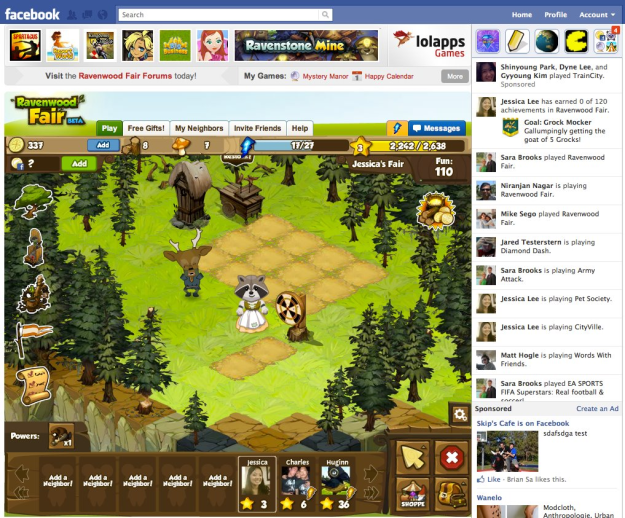
Just hours after Google added games to its new social network, Google+, Facebook fired back by announcing a massive overhaul of its apps platform, along with a variety of other changes to the site.
According to Facebook programmer Bruce Rogers, who posted on the site’s developers blog, the changes primarily includes “a major redesign to the Canvas Page,” which will give apps “greater real-estate on the user’s browser.” Included in this will be “a live ticker of real-time game related updates,” which will help “keep the users constantly engaged and updated with their friends’ activity on apps and games as they play,” Rogers writes.
Specific updates to the Canvas Page including bookmarks for apps, which allow users to quickly jump back into a game. A live feed, which will appear beneath the apps bookmarks will spew out automaticallly-created “playing” and “using” updates whenever a friend starts to use an app through the site. Developers will also be able to publish users’ achievements, scores, and other information (like when one user’s score surpasses that of a friend), to the live feed, which is intened to “make game play more competitive, social and exciting.”
In addition, developers will now be able to expand the size of the app screen based on the users’ screen resolution.
Users will also now be able to customize the order of their homepage bookmarks, as well as add bookmarks to a “Favorites” section, which is intended to make apps more visible to users, so that they will play them more often.
To top things off, Facebook will also begin publishing app-related content to users’ News Feeds, even to users “who don’t already use the app.” App-related content that gets a high level of user engagement will appear in people’s Feeds more often.
In other words, Facebook is bring game spam back to the News Feed — or, at least, that’s what it sounds like. We understand that Facebook now has to keep up with Google+ — but if this is how they plan on accomplishing that, then, well, good luck. That’s all we can say.
Editors' Recommendations
- How to set your Facebook Feed to show most recent posts
- Solve a creepy mystery with Snapchat’s new in-app AR game
- Facebook’s new Feeds tab emphasizes chronological posts
- Facebook’s Messenger and WhatsApp saw record usage on New Year’s Eve
- Facebook to take on Twitch and YouTube with a stand-alone gaming app


